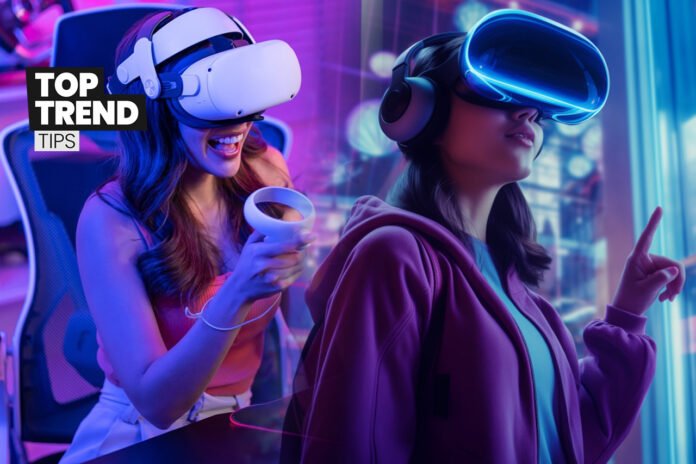The Intersection of Technology and Entertainment: What You Need to Know
The convergence of technology and entertainment has sparked a revolution, transforming how we create, consume, and interact with media. From immersive experiences to personalized content, the integration of technological advancements is reshaping the entertainment landscape in profound ways. Here’s an overview of what you need to know about this dynamic intersection and how it’s influencing the future of entertainment.
1. The Rise of Immersive Technologies
Virtual Reality (VR) and Augmented Reality (AR):
Virtual Reality (VR) and Augmented Reality (AR) have introduced entirely new ways to engage with entertainment. VR creates fully immersive environments that transport users to virtual worlds, while AR overlays digital content onto the real world, enhancing physical spaces with interactive elements.
Impact on Entertainment:
- Gaming: VR gaming offers unprecedented immersion, allowing players to explore and interact with 3D worlds. Games like Half-Life: Alyx and Beat Saber exemplify this technology’s potential.
- Film and TV: VR and AR are being used to create more engaging and interactive storytelling experiences. For example, VR experiences like The Lion King VR allow users to step into the world of their favorite films.
- Live Events: AR can enhance live performances and sports events with real-time statistics and interactive features, providing a richer viewing experience.
2. The Power of Artificial Intelligence (AI) and Machine Learning
Personalized Content Recommendations:
Artificial Intelligence (AI) and machine learning algorithms analyze user data to deliver tailored content recommendations. Streaming platforms like Netflix and Spotify use these technologies to suggest movies, shows, and music based on individual preferences.
Impact on Entertainment:
- Content Discovery: AI-driven recommendations help users discover new content they might not have found otherwise, enhancing their viewing or listening experience.
- Content Creation: AI is also being used in content creation, from generating scripts to editing videos. Tools like DeepArt use AI to create artwork in different styles, while others assist in producing music and visual effects.
3. Blockchain and NFTs in Content Creation and Distribution
Decentralized Platforms and Digital Ownership:
Blockchain technology and Non-Fungible Tokens (NFTs) are redefining how content is created, distributed, and monetized. Blockchain offers transparency and security for transactions, while NFTs provide a way for creators to sell unique digital assets directly to consumers.
Impact on Entertainment:
- Digital Art and Collectibles: NFTs have revolutionized the art world by allowing digital artists to sell unique pieces and retain royalties from future sales. Platforms like OpenSea and Rarible are leading this trend.
- Content Distribution: Blockchain can offer new ways for creators to distribute their work, bypassing traditional gatekeepers and enabling direct transactions with audiences.
4. The Evolution of Content Delivery
Streaming Services and On-Demand Access:
The shift from traditional media consumption to streaming services has been one of the most significant changes in recent years. Services like Netflix, Hulu, Disney+, and Amazon Prime Video offer on-demand access to a vast array of content, transforming how we watch TV and movies.
Impact on Entertainment:
- Content Variety: Streaming platforms provide a diverse range of content, including original programming and exclusive deals with creators.
- Binge-Watching Culture: The ability to access entire seasons of shows at once has changed viewing habits, leading to the phenomenon of binge-watching.
- Content Fragmentation: As more companies launch their own streaming platforms, content becomes fragmented across multiple services, leading to subscription fatigue for consumers.
5. Interactive and Social Media Experiences
Blending Entertainment with Social Interaction:
Social media platforms and interactive content are increasingly merging, creating new ways for users to engage with entertainment and connect with others.
Impact on Entertainment:
- Social Media Integration: Platforms like Instagram, TikTok, and Twitter have become integral to entertainment marketing, allowing creators to reach audiences directly and build communities around their content.
- Interactive Content: Shows and games with interactive elements, such as choose-your-own-adventure formats or live-streamed events with real-time audience participation, offer new forms of engagement and interaction.
Conclusion: Navigating the Future of Entertainment
The intersection of technology and entertainment is driving rapid change and innovation, offering exciting possibilities for creators and consumers alike. As VR and AR create immersive experiences, AI personalizes content, blockchain and NFTs redefine ownership and distribution, and streaming services transform media consumption, the landscape of entertainment is continuously evolving.
Staying informed about these trends and understanding their implications will be crucial for both enjoying and navigating the future of entertainment. Whether you’re a consumer looking to explore new experiences or a creator seeking to leverage these technologies, the integration of technology and entertainment will shape how media is experienced in the years to come.



